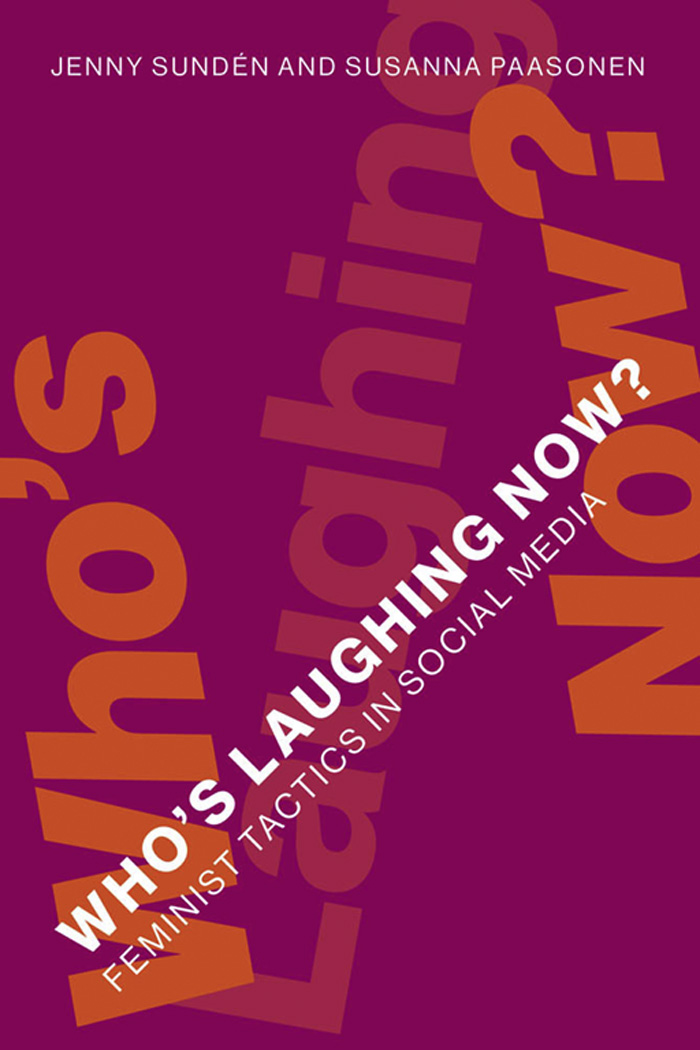Jenny Sunden - Whos Laughing Now? Feminist Tactics in Social Media
Here you can read online Jenny Sunden - Whos Laughing Now? Feminist Tactics in Social Media full text of the book (entire story) in english for free. Download pdf and epub, get meaning, cover and reviews about this ebook. year: 2020, publisher: MIT Press, genre: Home and family. Description of the work, (preface) as well as reviews are available. Best literature library LitArk.com created for fans of good reading and offers a wide selection of genres:
Romance novel
Science fiction
Adventure
Detective
Science
History
Home and family
Prose
Art
Politics
Computer
Non-fiction
Religion
Business
Children
Humor
Choose a favorite category and find really read worthwhile books. Enjoy immersion in the world of imagination, feel the emotions of the characters or learn something new for yourself, make an fascinating discovery.

- Book:Whos Laughing Now? Feminist Tactics in Social Media
- Author:
- Publisher:MIT Press
- Genre:
- Year:2020
- Rating:5 / 5
- Favourites:Add to favourites
- Your mark:
- 100
- 1
- 2
- 3
- 4
- 5
Whos Laughing Now? Feminist Tactics in Social Media: summary, description and annotation
We offer to read an annotation, description, summary or preface (depends on what the author of the book "Whos Laughing Now? Feminist Tactics in Social Media" wrote himself). If you haven't found the necessary information about the book — write in the comments, we will try to find it.
Whos Laughing Now? Feminist Tactics in Social Media — read online for free the complete book (whole text) full work
Below is the text of the book, divided by pages. System saving the place of the last page read, allows you to conveniently read the book "Whos Laughing Now? Feminist Tactics in Social Media" online for free, without having to search again every time where you left off. Put a bookmark, and you can go to the page where you finished reading at any time.
Font size:
Interval:
Bookmark:

Jenny Sundn and Susanna Paasonen
The MIT Press
Cambridge, Massachusetts
London, England
2020 Massachusetts Institute of Technology
All rights reserved. No part of this book may be reproduced in any form by any electronic or mechanical means (including photocopying, recording, or information storage and retrieval) without permission in writing from the publisher.
This book was set in ITC Stone Serif Std and ITC Stone Sans Std by New Best-set Typesetters Ltd.
Library of Congress Cataloging-in-Publication Data
Names: Sundn, Jenny, 1973- author. | Paasonen, Susanna, 1975- author.
Title: Whos laughing now? : feminist tactics in social media / Jenny Sundn and Susanna Paasonen.
Description: Cambridge, Massachusetts : The MIT Press, [2020] | Includes bibliographical references and index.
Identifiers: LCCN 2020004715 | ISBN 9780262044721 (hardcover)
Subjects: LCSH: Internet and women. | Internet and activism. | Feminism. | Social media. | Humor.
Classification: LCC HQ1178 .S86 2020 | DDC 305.42dc23
LC record available at https://lccn.loc.gov/2020004715
10 9 8 7 6 5 4 3 2 1
d_r0
To Gittan
Our work for this book started in the spring of 2017 as an article for the Feminist Media Studies journal special issue Online Misogyny. As we greatly enjoyed working on shameless, resistant hags and sluts, we started planning a book project the following autumn as the #MeToo movement first broke. There has been an immediacy to our project, yet its speed has also been a matter of joy and pleasure taken in thinking, writing, and giggling together.
We would like to thank the Faculty of Humanities and the School of History, Culture and Art Studies at the University of Turku, Finlandand Dean Jaakko Suominen, in particularfor supporting our work on this book with a writing retreat grant and Jennys two-year visiting professorship. We would also like to thank the Department of Media Studies research seminar at Turku and the advanced seminar in gender studies at Sdertrn University in Stockholm for comments and suggestions to article drafts leading up to our book. Further, warm thanks for their helpful feedback go to the editors of the Feminist Media Studies special issue, Debbie Ging and Eugenia Siapera; to Susannas coeditors, Kaisu Hynn-Granberg and Mari Lehto, on a Social Media + Society special issue on Affective Body Politics; and to the anonymous reviewers for both journals. Two articles that form the basis for chapters 3 and 5, respectively, have been published as Shameless Hags and Tolerance Whores: Feminist Resistance and the Affective Circuits of Online Hate, Feminist Media Studies 18(4) (2018): 643656, and Inappropriate Laughter: Affective Homophily and the Unlikely Comedy of #MeToo, Social Media + Society (OctoberDecember 2019): 110.
Last, but certainly not least, thanks to the staff at the MIT Press, most notably Gita Manaktala, for her support and enthusiasm for what is not the most obvious of approaches to feminist social media research, and the authors of the nine manuscript reviews that made us feel very well read.
Consider this hypothetical scene: Two feminist scholars are having a hotel breakfast in the very beginning of the #MeToo movement in October 2017. Well, Im gonna have some more coffee, possibly an orange juice, one of them says. Me too!, the other replies, making the hashtag symbol up in the air with her fingers. In a split second, both are laughing, helplessly. The more they realize how inappropriate it is to laugh, the harder it becomes not to, and tears are soon running down their cheeks. Starting from this scene of absurd laughter out of place and its contagious energy, this book sets out to investigate feminist tactics of resistance in times of violent online sexism. Online sexism, hate, and harassment aim at silencing subjects coded as female or feminine by resorting to affective mechanisms such as shaming and fear. We are interested in how humor and laughter can help to reroute and reshape these forces and what their affective volatility may add to our understanding of mundane politics. Zooming in on the dynamics of shame, in particular, we further examine the complex ways in which sexuality operates within the affective politics of social media in connection with shame and shamingand, by extension, the potentialities involved in shamelessness.
In what follows, we move from the markedly nonhumorous #MeToo movement and its ways of rewiring gendered sexual shame to instances where it collides with laughter; to the politics and ethics of commenting on and publishing hateful or otherwise offensive tweets, posts, and messages; to the appropriation of derogatory terminology for resistant ends; and to the tactic of making visible the exclusion of women from the realm of professional expertise and authority within the Congrats, you have an all male panel! Tumblr blog. We look into unsolicited vulva pics, consider the possibilities and limitations of satire based on the reversal of gender roles, and argue for the value of absurdity in turning things around. We ask what has given the initiatives we examine their particular affective lift and also scrutinize the conditions and constraints that they both operate in and generate.
Humor and laughter are possibly not the first qualities or tactics to be associated with feminist activism, online or off. The feminist killjoy (Ahmed 2010, 2015)the one who disrupts other peoples sense of happiness and refuses to laugh when expected to do somore commonly embodies feminist tactics in the cultural imaginary. There certainly seems to be equally little to laugh about in the ubiquity of online hate, sexism, and misogyny (Jane 2016; Penny 2013) fueled by toxic masculinity (e.g., Consalvo 2012; Marwick and Caplan 2018; Massanari 2015; Phillips 2015; Salter and Blodgett 2012). As scholarly attention has begun to cluster on online feminist resistance and activism, it has focused on the affective dynamics of anger, rage, and frustration, as exemplified by the high visibility of the #MeToo movement (e.g., Boyle 2019; Chamberlain 2017; Gill and Orgad 2018; Guha, Gajjala, and Stabile 2019; Koivunen, Kyrl, and Ryberg 2018; Mendes, Ringrose, and Keller, 2019).
At the same time, humor plays a key role in how and where attention clusters on social media, which is increasingly providing platforms and modes for activist mobilization and critique. In this book, we explore feminist initiatives that have grown popular, even viral, and exemplify what Sarah Banet-Weiser (2018, 10), in her discussion of popular feminism, identifies as the imperative of visibility within online attention economy. Here, all kinds of campaigns, from advertising to activism, aim at virality where contenthashtags, posts, images, video clips, animated GIFs, or something elsegains a certain liveliness through its networked sharing, circulation, variation, multiplication, liking, and commenting. Virality is descriptive of how content spreads across platforms and geographical terrains in ways that cannot be planned, foreseen, controlled, or achieved by any single individual or group. In the optimized visibility, attention, reach, and volume of redistribution that virality entails, it remains something of a ubiquitous goal. Virality involves affectivity, which Tony D. Sampson (2012, 14) describes as mesmeric fascinations, passionate interests, and joyful encounters. As discussed in the chapters that follow, the registers of dismay, disgust, anger, and outrage nevertheless play an equally key role in how people engage with social media content, possibly setting it in viral circulation of varying lengths and speeds. Outrage alone involves considerable capacity to set bodies in motion, as the #MeToo movement aptly illustrates.
Next pageFont size:
Interval:
Bookmark:
Similar books «Whos Laughing Now? Feminist Tactics in Social Media»
Look at similar books to Whos Laughing Now? Feminist Tactics in Social Media. We have selected literature similar in name and meaning in the hope of providing readers with more options to find new, interesting, not yet read works.
Discussion, reviews of the book Whos Laughing Now? Feminist Tactics in Social Media and just readers' own opinions. Leave your comments, write what you think about the work, its meaning or the main characters. Specify what exactly you liked and what you didn't like, and why you think so.






